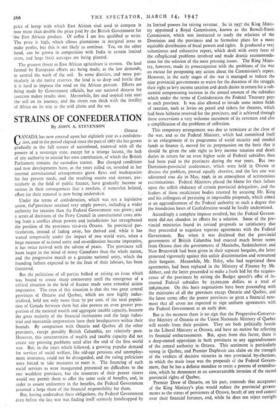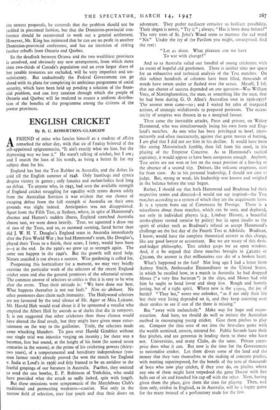STRAINS OF CONFEDERATION
By JOHN A. STEVENSON Ottawa CANADA has now entered upon her eightieth year as a confedera- tion, and in the period elapsed since the pact of 1867 she has grown gradually to the full stature of nationhood, endowed with all the powers of a sovereign state, except for a strange lacuna,. the lack of any authority to amend her own constitution, of which the British Parliament remains the custodian trustee. But changed conditions and new developments have, as the years rolled on, revealed in her internal constitutional arrangements grave flaws and inadequacies for her present needs, and the resulting strains and stresses, par- ticularly in the field of public finance, have gradually become so serious in their consequences that a resolute, if somewhat belated, effort for their removal is now being undertaken.
Under the terms of confederation, which was not a legislative union, the-provinces retained very ample powers, including a wider authority for taxation than the Federal Government was given ; and a series of decisions of the Privy Council in constitutional cases aris- ing from a conflict about powers and jurisdictions has strengthened the position of the provinces vis-a-vis Ottawa. So provincial par- ticularism, instead of fading away, has thrived and, while it has waned temporarily under the impact of two world wars, when a large measure of national unity and co-ordination became imperative, it has twice revived with the advent of peace. The provinces still loom larger in the mind of many Canadians than the whole nation, and the progressive march to a• genuine national unity, which the founding fathers expected to be the fruit of their labours, has been frustrated.
But the politicians of all parties balked at raising an issue which was bound to create sharp controversy until the emergence of a critical situation in the field of finance made some remedial action imperative. The crux of this situation is that the two great central provinces of Ontario and Quebec, which are now highly indus- trialised, hold not only more than 70 per cent, of the total popula- tion of Canada between them but also possess an even greater pro- portion of the national wealth and aggregate taxable capacity, because the great majority of the financial institutions and the large indus- trial and mercantile corporations have their headquarters within their bounds. By comparison with Ontario and Quebec all the other provinces, except possibly -British Columbia, are relatively poor. However, this concentration of wealth and taxable capacity did not create any pressing problems until after the end of the first world war. But, in the years which followed, a growing popular demand for services of social welfare, like old-age pensions and unemploy- ment insurance, could not be disregarded, and the ruling politicians were forced to take measures to meet it. The financing of such social services as were inaugurated presented no difficulties to the two wealthier provinces, but the resources of their poorer sisters would not permit them to offer the same scale of benefits, and, in order to assure uniformity in the benefits, the Federal Government assumed a large share of the financial responsibility for them.
But, having undertaken these obligations, the Federal Government even before the last war was finding itself seriously handicapped by its limited powers for raising revenue. So in 1937 the King Minis- try appointed a Royal Commission, known as the Rowell-Sirois Commission, which was instructed to study the relations of the Dominion and the provinces and to formulate plans for a more equitable distribution of fiscal powers and rights. It produced a very voluminous and exhaustive report, which dealt with every facet of the cemplicated problems involved and made drastic recommenda- tions for the solution of the most pressing issues. The King Minis- try, however, made its preoccupation with the problems of the war an excuse for postponing any action about the Commission's report. However, in the early stages of the war it managed to induce the nine provincial governments to waive for the duration of the struggle their right to levy income taxation and death duties in return for a sub- stantial compensating increase in the annual amount of the subsidies which under the terms of Confederation the Federal Treasury pays to each province. It was also allowed to invade some minor fields of taxation, such as levies on petrol and tickets for theatres, which had been hitherto reserved for the provinces, and it achieved through these concessions a very welcome increment of its revenues and also a simplification of the problems of collection.
This temporary arrangement was due to terminate at the close of the war, and so the Federal Ministry, which had committed itself to an enlargement of its programme of social security and needed funds to finance it, moved for its perpetuation on the basis that it should be given the sole right to levy income taxation and death duties in return for an even higher scale of Federal subsidies than had been paid to the provinces during the war years. But two Dominion-provincial conferences, which were held in Ottawa to discuss the problem, proved equally abortive, and the last one was adjourned sine die in May, 1946; in an atmosphere of acrimonious recriminations. Federal Ministers placed the blame for their failure upon the selfish obduracy of certain provincial delegations, and the leaders of these recalcitrant bodies retorted by accusing Mr. King and his colleagues of persisting in impossible proposals, which aimed at an aggrandisement of the Federal authority to such a degree that the foundation bases of Confederation would be fatally undermined.
Accordingly a complete impasse resulted, but the Federal Govern- ment did .not abandon its efforts for a solution. Some of the pro- vincial ministries found its revised proposals so satisfactory that they proceeded to negotiate separate agreements with the Federal Government. But when it was disclosed that the provincial government of British Columbia had exacted much better terms from Ottawa than the governments of Manitoba, Saskatchewan and New Brunswick had been given in their separate bargains, The latter protested vigorously against this unfair discrimination and renounced their bargains. Meanwhile, Mr. Ilsley, who had negotiated these agreements, had been replaced in the Ministry of Finance by Mr. Abbott, and the latter proceeded to make a fresh bid for the acquies- cence of the provinces by raising the Budget speech's offer of in- creased Federal subsidies by 25,000,000 dollars to a total of 206,000,000. On this basis negotiations have been proceeding with the ministries of all the provinces except Ontario and Quebec, and the latest terms offer the poorer provinces so great a financial ease- ment that all seven are expected to sign uniform agreements with the Federal Government at an early date.
But at the moment there is no sign that the Progressive-Conserva- tive Ministry of Ontario or the Union Nationale Ministry of Quebec will recede from their position. They are both politically hostile to the Liberal Ministry at Ottawa, and have no motive for relieving its financial embarrassments. But, apart from this factor, there is a deep-rooted opposition in both provinces to any aggrandisement of the central authority in Ottawa. This sentiment is particularly strong in Quebec, and Premier Duplessis can claim on the Strength of the verdicts of decisive victories in two provincial by-elections, in which the main issue was the proposals of the Federal Govern- ment, that he has a definite mandate to resist a process of centralisa- tion, which he denounces as an unwarrantable invasion of the sacred provincial rights of Quebec.
Premier Drew of Ontario, on his part, contends that acceptance of the King Ministry's plan would reduce the provincial govern- ments to the status of pensioners of Ottawa, bereft of any real control over their financial fortunes, and, while he does not reject outright the newest proposals, he contends that the problem should not be tackled in piecemeal fashion, but that the Dominion-provincial con- ference should be reconvened to work out a general settlement. However, Mr. King has intimated that he can see no profit in another Dominion-provincial conference, and has no intention of risking further rebuffs from Ontario and Quebec.
So the deadlock between Ottawa and the two wealthiest provinces is unsolved, and obviously any new arrangement, from which more than two-thirds of Canada's population and an even larger share of her taxable resources are excluded, will be very imperfect and un- satisfactory. But undoubtedly the Federal Government can go ahead with its plans for completing its ambitious programme of social security, which have been held up pending a solution of the finan- cial problem, and can levy taxation through which the people of Ontario and Quebec will be mulcted to ensure a uniform distribu- tion of the benefits of the programme among the citizens of the poorer provinces.



































 Previous page
Previous page